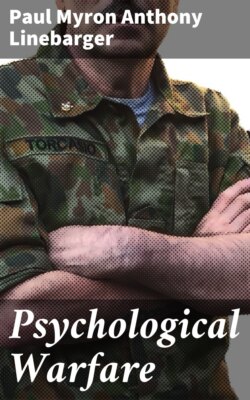Читать книгу Psychological Warfare - Paul Myron Anthony Linebarger - Страница 35
На сайте Литреса книга снята с продажи.
Media Limitations.
ОглавлениеPsychological warfare should not broadcast into areas in which radio sets are unknown. Psychological warfare should not drop books to illiterates. These rules seem obvious but they have often been violated. Psychological warfare should not assume that an extensive news or morale campaign is going to achieve the desired results unless there is trustworthy intelligence to the effect that propaganda is getting through.
It is ridiculous to broadcast to the masses of a country when the masses are known not to have radio facilities. This was done in the anti-Japanese broadcasts of OWI, at least in the early part of the war, in which mass-audience soap operas and popular music were sent to Japan on the short-wave—this despite reports that short-wave sets were almost unknown outside governmental or plutocratic circles. What was known was that the Japanese government itself had listening facilities, and that the content of American broadcasts was relayed through Japanese military and governmental groups. The propaganda (to fit the medium, radio) should have been designed to affect the persons actually reached, and not an audience known to be out of reach. The mere fact that enemy counterpropaganda mentions one's own material is nothing more than a professional exchange of compliments. Goading the enemy radio into a reply may be fun, but unless non-propagandists are known to be listening, the fun is expensive and unprofitable.
(It is really fun, though. The author suggested in the spring of 1942 that the San Francisco radio carry an item to the effect that "American art lovers" hoped the Japanese would move their priceless books and paintings away from the great cities. This was preparation for eventual nagging on the topic, "the air raids will get you if you don't watch out!" The radio civilians in San Francisco put the item on the air. Nothing was heard from the Japanese on the subject. Four days later, Radio Luxembourg [then under Nazi control, of course] broadcast in German to Europe that a spokesman for the "beastly American Air Ministry" had told the Japanese that the Americans planned to destroy cultural monuments. The Nazi commentator added that this was characteristic of the actions of uncivilized Americans. New York picked up the German broadcast. The author enjoyed seeing his item go all the way around the world, but in retrospect he wonders whether he did any good other than to please himself. He did do the actual harm of giving the Nazis another point to distort.)
Media consist simply of the facilities possessed. These are, most commonly:
(1) Standard-wave radio;
(2) Short-wave radio;
(3) Loudspeakers;
(4) Leaflets;
(5) Pamphlets;
(6) Books;
(7) Novelties.
The limitations consist simply of applying the right medium at the right time. Radio broadcasts need be made only when receiving sets are known to exist. Written material should be dropped only to areas in which at least some people can read. (The OWI in China, at the request cf CBI Forward Echelon Headquarters, made up the leaflet showing pictures only. This was designed for the aboriginal hillmen between China and Tibet—to tell them to rescue downed American pilots. Broadcasting to these people would have been as profitable as spitting in the ocean. None of them could read, much less understand radio.) The probable number of listeners or readers should be calculated conservatively, taking enemy policing, amount of enemy interest, customs of the people, tension among enemy troops or civilians and other appropriate factors into account.
Occasionally propaganda media exceed the expected limitations. The Americans and British dropped leaflets on Berlin. The leaflets had little key numbers in the corners, showing to which series they belonged, and could thus be arranged in series. The Germans prohibited civilians from picking up the leaflets. The Nazi authorities followed up the prohibition by sending the Hitlerjugend and Hitlermädel out to pick up the leaflets and turn them in for destruction. The boys and girls did their job with gusto. Vast quantities were turned in for destruction. What the Nazis discovered—too late, too late—was that the schoolchildren had begun collecting the leaflets, using the key numbers to make up perfect sets. Some numbers were rarer than others, so that the Hitlerite children swapped Allied leaflets all over Berlin, trying to make up attractive albums. Mother and Father—who did not dare pick the leaflets up off the street for fear the Gestapo might be watching—found a convenient file, reasonably complete, in the room of little Fritzl or Ermintrude! The most hopeful British or American planner could not have counted on such a happy result.
